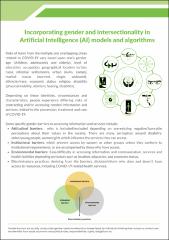Briefing Papers
Browse by
Recent Submissions
-
Transforming Early Childhood Development: A Centralized, Data-Driven Solution for Kenya
(APHRC, 2025)In Kenya, many young children face developmental challenges that impact their future, with those in informal settlements and underserved counties like Homa Bay and Isiolo particularly affected by poverty, malnutrition, and ... -
Gender Mainstreaming Practices in Basic Education & Teacher Training In Kenya: Study Summary
(APHRC, 2025)The Government of Kenya, through the Ministry of Education, in line with Sustainable Development goals 4 and 5, is committed to providing quality education and attaining gender parity at all levels of education. To this ... -
Celebrating Reading Milestones: Graduating from a Zero Reader to a Confident Reader
(APHRC, 2025)Foundational learning is defined as "basic literacy, numeracy, and transferable skills such as socio-emotional skills." Recently, various global and national initiatives have been put in place to promote foundational ... -
Strengthening the Capacity of Teachers on Play-Based Learning in Sub-Saharan Africa
(APHRC, 2023-07)Quality early childhood education (ECE) can improve school readiness, positively influence learning outcomes, and increase primary and secondary school completion rates, particularly for marginalized children (1). Play is ... -
Contextual Drivers of Success in Education during the COVID-19 Pandemic: Evidence and Insights from Within and Across 7 Countries in Africa
(APHRC, 2023)Reflection is a valuable practice that allows intentional assessment and evaluation of situations and practices, while taking stock of lessons learned and identifying areas of improvement, individually or collectively. ... -
Improving Girls’ Education and Wellbeing in Senegal: The Place of Parents in Girls’ Schooling
(APHRC, 2022-11)Senegal has a predominantly young population, with about 57.7% under the age of 18 years. Therefore, Senegal faces a strong demand for education and healthcare, particularly sexual and reproductive health and the ... -
Assessing the Readiness of Healthcare Facilities to Provide Non-Communicable Disease Services in Kenya
(APHRC, 2022-12)Non-communicable diseases (NCDs) pose a major global health challenge in the 21st century, undermining socio-economic development around the world [1]. In low-resource settings, NCDs drain household resources due to ... -
Child Marriage an Appraisal of Zimbabwe’s Proposed Marriage Bill, 2019
(APHRC, 2022-10)Child marriage disproportionately affects girls, threatens their health and wellbeing, and also negatively impacts their education and life opportunities1. Given all the health and socio-economic risks of child marriage, ... -
Incorporating Gender and Intersectionality In Artificial Intelligence (AI) Models and Algorithms
(APHRC, 2022-10)Risks of harm from the multiple and overlapping crises related to COVID-19 vary based upon one’s gender, age (children, adolescents and elderly), level of education, occupation, geographical location (urban, rural, ... -
Why Lowering The Age of Consent to Sexual and Reproductive Health Services Is Beneficial for Adolescents' Health and Wellbeing
(APHRC, 2022-10)Age of consent laws enacted to protect children from different forms of abuse 1-4. The minimum age of consent to sex law, for example, is meant to protect minors from sexual exploitation, abuse, and the adverse effects ...








